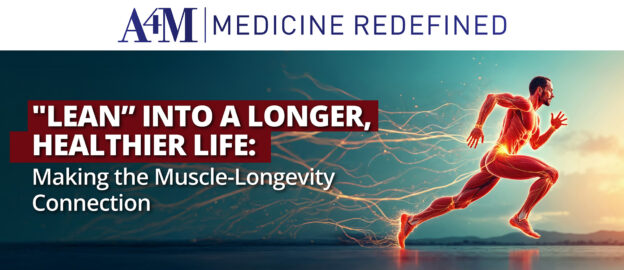Can getting stronger help you live longer? Peter Attia, MD, says yes. Dr. Attia, a Stanford-trained physician and co-founder of the premium preventive health and longevity concept Biograph, is one of the most visible figures in longevity medicine. He recently spoke about his firm belief that cardiorespiratory fitness, muscle mass, and strength have a much higher association with longevity than traditional diagnostic health markers.
“The data are pretty clear,” Dr. Attia told 60 Minutes contributing correspondent Norah O’Donnell during a recent interview. “When you look at things like cardiorespiratory fitness, when you look at muscle mass, when you look at strength, they have a much higher association than things like even cholesterol and blood pressure.”
Eat, Sleep, Walk…Faster!
Dr. Attia made it clear that while there are many factors that can promote a longer life — healthy diet, sufficient sleep, and stress management — cardiovascular exercise and a muscle-centric fitness routine are among the most important.
Recent research backs him up. Findings published in the American Journal of Preventive Medicine show that individuals who engaged in just 15 minutes of brisk walking daily experienced up to a 20% lower risk of premature mortality compared to slower walkers, even those who exercised for longer durations.
As for that healthy diet, a recent NHANES study noted that higher intakes of animal protein were linked to a modest reduction in cancer mortality risk, a conclusion that directly challenges the idea that animal protein automatically fuels cancer growth.
Getting a Grip on Aging
Dr. Attia, who spoke at LongevityFest last year, said the muscle-longevity connection can be measured by taking the VO2 max test. The results indicate cardiorespiratory fitness by measuring how much oxygen the body can use during intense exercise.
“Your VO2 max is more strongly correlated with your lifespan than any other metric I can measure,” Dr. Attia said. “It predicts your risk of death from any cause, even more than your blood pressure, cholesterol, or smoking status.”
Dr. Attia administers the V02 max test as part of his longevity assessment and treatment protocols. And while raising V02 max levels is recommended, there is another way to measure fitness and longevity that doesn’t require a treadmill workout: building grip strength.
“If you look at the correlation between grip strength and dementia risk or mortality, it’s staggering,” Dr. Attia explained. “Grip strength is a proxy for overall strength, and that kind of strength is acquired, not inherited. The work you do to build it is what protects your brain.”
And while we know the brain is an organ, not a muscle, maintaining its health and functionality is critical to improving aging outcomes and ultimately, extending lifespan.
The Muscle-Metabolic-Longevity Connection
Brisk walking, animal protein, VO2 max, and grip strength all converge around a central mechanism: skeletal muscle as the body’s metabolic powerhouse and longevity regulator. A study published in Cold Spring Harbor Perspectives in Medicine reveals that skeletal muscle functions as an endocrine organ, secreting myokines that regulate metabolism, reduce inflammation, and protect against age-related disease. This explains why grip strength serves as such a powerful predictor of mortality: it’s a measurable proxy for total muscle mass and metabolic capacity.
Muscle tissue serves as the body’s primary glucose disposal site. Research published in Diabetes Care demonstrates that skeletal muscle is responsible for approximately 75-80% of insulin-stimulated glucose disposal, directly connecting muscle mass to improved insulin sensitivity and metabolic flexibility throughout the lifespan. An additional study in JAMA Network Open shows that individuals who maintain higher lean muscle mass combined with cardiovascular fitness experience significantly lower rates of cognitive decline. Muscle tissue requires robust blood flow and oxygen delivery, measured by VO2 max, to function optimally. When cardiovascular capacity declines, so does the muscle’s ability to act as a metabolic regulator.
A 2022 British Journal of Sports Medicine study analyzing data from over 480,000 adults found that muscle-strengthening activities were associated with a 10-17% lower risk of all-cause mortality, cardiovascular disease, total cancer, diabetes, and lung cancer – evidence of muscle’s protective effects across multiple disease pathways.
Muscle is a fundamental determinant of metabolic health, cognitive function, and longevity itself. For practitioners focused on extending healthspan, muscle-centric interventions represent not an optional enhancement, but an essential foundation of comprehensive patient care.
LongevityFest 2025: Muscle-Centric Medicine Takes Center Stage
You may remember Dr. Peter Attia as one of the headliners of LongevityFest 2024, where he shared data-driven insights into healthspan optimization and examined the metabolic pathways to longevity. This year, we’re thrilled to announce board-certified physician and Founder of Muscle-Centric Medicine, Gabrielle Lyon, DO, as our LongevityFest Keynote Speaker. Join her and an incredible lineup of 120+ other visionaries in Las Vegas this December 12-14, at the world’s biggest and most influential longevity event, LongevityFest 2025. Click here to secure your ticket today.

